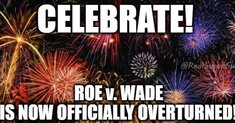
Christ the King Law Center (CKLC) rejoices in the U.S. Supreme Court's decision to overturn Roe v. Wade! This decision has been a stain on the moral integrity of this country for nearly fifty years. It was wrongly decided from its beginning. As Justice Alito stated in the opinion of the court: "Roe was egregiously wrong from the start. Its reasoning was exceptionally weak, and the decision has had damaging consequences." The joy we feel at the overturning of this one of the worst, if not the worst, decision in the history of the Court is difficult to describe and certainly a dream come true. And yet while we rejoice in that glorious day we recognize that challenges still exist in order to build a just legal order in this country that recognizes the sovereignty of Our Lord Jesus Christ and the supremacy of His law.
First, while the Court ruled that there was no constitutional right to an abortion which the states cannot prohibit it nevertheless did not rule that unborn persons have a right to life that must be protected by law. As the Court's opinion states:
'In some States, voters may believe that the abortion right should be even more extensive than the right that Roe [v. Wade] and Casey recognized. Voters in other States may wish to impose tight restrictions based on their belief that abortion destroys an "unborn human being." Miss. Code Ann.§41-41-191(4)(b). Our Nation's historical understanding of ordered liberty does not prevent the people's elected representatives from deciding how abortion should be regulated.'
And further on:
"The Constitution does not prohibit the citizens of each State from regulating or prohibiting abortion. Roe [v. Wade] and Casey arrogated that authority. We now overrule those decisions and return that authority to the people and their elected representatives."
Thus according to the Court each state can decide for itself whether to permit or prohibit abortion. Nowhere in the Court's opinion did it determine whether the 5th and 14th Amendment's provisions which prohibits the federal and state governments from denying any person life without due process of law applies to the unborn. Nor was there any determination in the opinion as to whether these Amendment's provisions-which prohibit the government from denying any person the equal protection of the law-applies to the unborn. In fact the Court expressly refused to base its decision on such an issue: Our opinion is not based on any view about if and when prenatal life is entitled to any of the rights enjoyed after birth. The unborn are undoubtedly persons as evidenced by science, reason, and divine revelation and therefore they are entitled to the constitutional protections offered by the 5th and 14th amendments. [1]
Second, the Court expressly stated that it only ruled on whether there was a right to abortion in the U.S. Constitution and ruled out the possibility that this decision applies or can be applied to overruling other egregious decisions of that Court against the natural law which claimed there was a constitutional right to contraception, sodomy, and "gay marriage". As the Court stated:
'the Solicitor General suggests that overruling those decision [i.e. Roe v. Wade and Casey] would "threaten the Court's precedents holding that the Due Process Clause protects other rights." Brief for United States 26 (citing Obergefell, 576 U.S. 644; Lawrence, 539 U.S. 558; Griswold, 381 U.S. 479). That is not correct for reasons we have already discussed. As even the Casey plurality recognized, "[a]bortion is a unique act" because it terminates "life or potential life." 505 U.S. at 852; see also Roe, 410 U.S., at 159 (abortion is "inherently different from martial intimacy," "marriage," or "procreation"). And to ensure that our decision is not misunderstood or mischaracterized, we emphasize that our decision concerns the constitutional right to abortion and no other right [such as the right to contraception, sodomy, and "gay marriage"]. Nothing in this opinion should be understood to cast doubt on precedents that do not concern abortion.'
The Court is correct to assert that abortion is "a unique act" but it is incorrect for it to assert that it is "inherently different from marital intimacy," "marriage," or "procreation" at least as a matter of law. This is because abortion was considered a "privacy right" by the Court prior to the Dobbs decision just like "marriage", "marital intimacy", and "procreation". So now that the Court has effectively and rightly removed abortion from consideration as a "privacy right" under constitutional law it would make sense to then leave open for consideration revisiting the Court's other "privacy right" decisions.
Third, the Court did not mention God's law(s) as the reason or even a reason as to why Roe v. Wade should be overturned. The only set of laws that the Court indicated was determinative in whether abortion is a fundamental right in the United States is the United States constitution. However, this constitution, important and influential as it is, is still only a mere construct of men, unlike the ten commandments which were written by almighty God Himself or the Scriptures which were written under the inspiration of God and has Him as their author. [2] So the U.S. constitution, just like any other set of laws created by men, is subject to the laws of God. It is not exempt.
All of man's laws are subject to God's laws. [3]
Therefore, the day that the Supreme Court overturned Roe v. Wade is undoubtedly a great day where the Court made a big step in the right direction in protecting countless unborn children but also in establishing a just legal order. However, we should not let our emotions blind us to the reality that while this decision is the best outcome we can get with the current makeup of the Supreme Court we nevertheless know that there are still difficulties present in building a legal system that should rightly recognize the social reign of Christ the King.
[1] And not to mention the 5th Commandment of God which prohibits the taking of innocent human life.
[2] Dei Filius 7.
[3] See Brian M. McCall, "The Architecture of the Law: Building Law on a Solid Foundation: The Eternal and Natural Law," Vera Lex 10 (2009): 47; Brian M. McCall, "Consulting the Architect when Problems Arise: The Divine Law," Georgetown Journal of Law and Public Policy 9 (2011): 103.
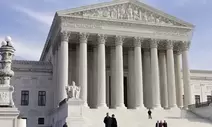
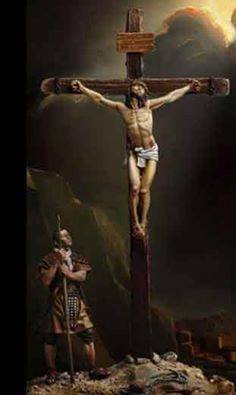
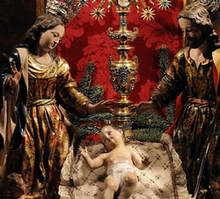
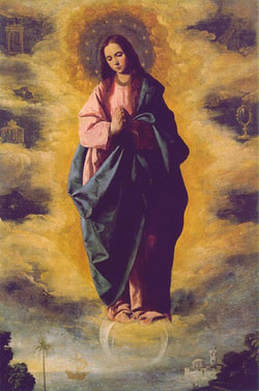

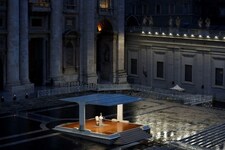
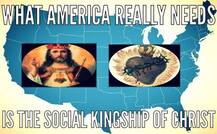
 RSS Feed
RSS Feed
